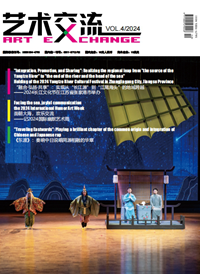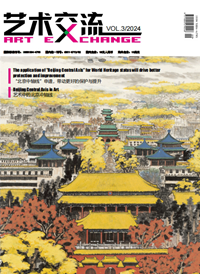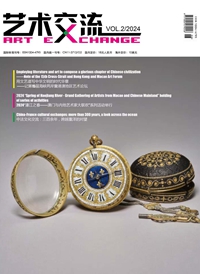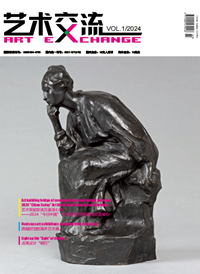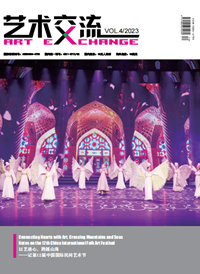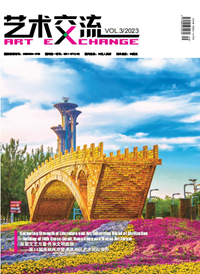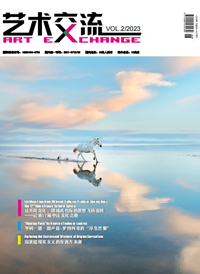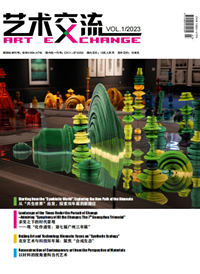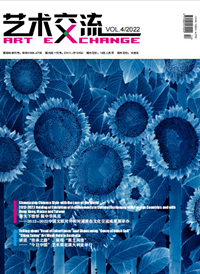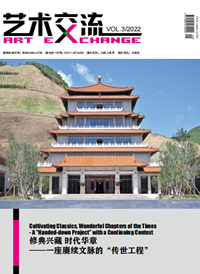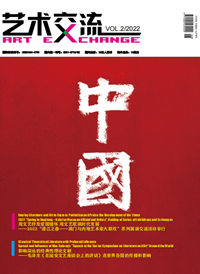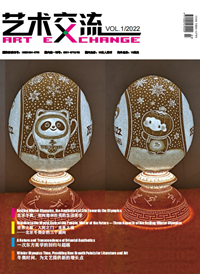Maintain Cultural Traditions,Pass on Shared Values
Art Exchange VOL.Art Exchange|Zhang Pan Photo by an Xuezhu
Maintain Cultural Traditions,Pass on Shared Values
——Discussion about Chinese Culture by Cross-Strait,Hong Kong and Macao Film and Television Cirles
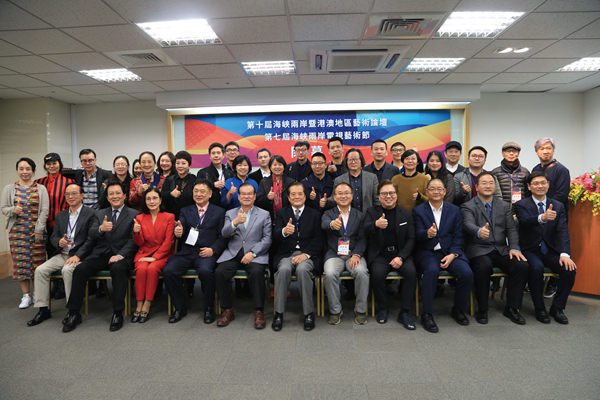
Guests' group photo at forum closing ceremony
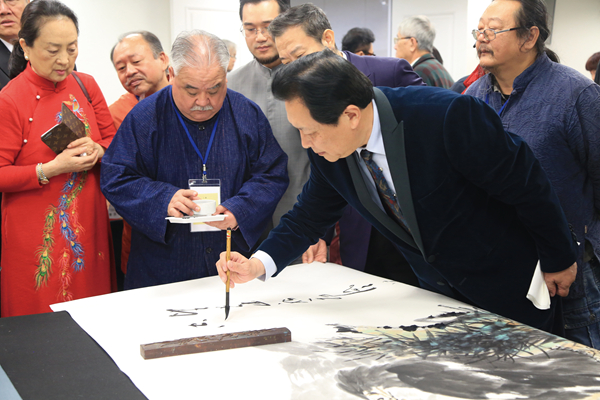
Performing site of the 4th Cross-Strait TV Artists Painting and Calligraphy Exhibition
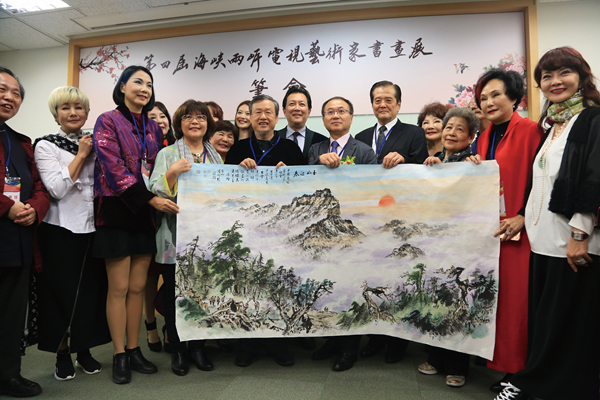
The 4th Cross-Straits TV Artists Painting and Calligraphy Exhibition has been held in Taipei, Taiwan on 26th, December. The photo shows that participating artsits exchanges works of painting and callingraphy.
"Culture is an important force for the survival and development of the nation, and film and television art is a complex of time and space, playing a unique role in popularizing culture, spreading value, and nourishing the soul," said Hu Zhengrong, vice-chairman of China TV Artists Association. Experts and artists from the cross-Straits, Hong Kong and Macao regions in the field of film and television art have gathered in Taiwan with the high respect for the outstanding Chinese traditional culture and the beautiful expectations of the continuity of the Chinese culture.
More than 120 film and television artists, experts, scholars and practitioners from across the Taiwan Straits have convened in Taiwan to participate into the 10th Art Forum of Cross-Straits, Hong Kong and Macao Region, and the 7th Cross-Straits Television Arts Festival, discussing about the Chinese traditional culture and the development of modern film and television art industry.
Leading audiences to appreciate the beauty of Chinese culture
Wang Weijiang, President of Taiwan Visa and Audio Production Association said that, in the face of global competition in the 21st century, the Chinese people across the Strait, Hong Kong and Macao must accomplish the due work in cultural development and promote the advancement of cultural and creative industries. With the theme of film and television, the event have brought together elites and scholars from across the Taiwan Straits, Hong Kong and Macao to strengthen the integration of film and television content, culture and art. With more complete and perfect film and TV techniques, it shall showcase the style and content of traditional culture and lead the audiences to appreciate the beauty of Chinese traditional culture and art.
Jiao Xiongping, professor of film department of Taipei National University of the Arts, told reporters that cross-Straits, Hong Kong and Macao film and television cooperation has ushered in a new golden age, which can be shared in terms of creative talents, international experience, capital, and market. Mainland movies are relatively heavy, sometimes lacking in delicate personalities. However, Taiwanese films are full of relaxed personalities, but sometimes lacking social and historical care, which may complement each other in cross-Straits cooperation. At present, the mainland's capital and market can provide Taiwan artists with much room for maneuver, and island's long-term accumulated artistic experience and technology can promote the development of the mainland film industry. The cooperation cross the Straits, Hong Kong and Macao can create a wonderful Chinese culture in the new century.
Taiwan can appreciate historical drama from the mainland
According to Tang Guoqiang, a mainland performing artist, Taiwan's protection of Chinese culture is remarkable, and the public can appreciate the historical film and television dramas quite well. He said that he was surprised that the works he starred in could cause a sensation in the island, which was due to the historical depth and practical significance of the writer Er Yue-he, only through which could the actors be familiar with the audiences.
Based upon the discovery by Xu Zidong, professor of the Chinese department of Lingnan University, some people from the publishing industry have summed up that the book can be sold more if there is a character of "Speak" in the title. The voice now takes more priority than the text, and it is more powerful to express through new media than to simply publish books. At present, the way people read books has changed, and those who engage in new media have to rely on traditional culture to express themselves. The most ideal status is a winwin situation. Nowadays, the highest level of culture is still the books, and the classical, but mobile phones are changing people's lives. It is an inevitable direction to move from reading to film and accepting carriers to mobile phones.
Wen Haojie, the screenwriter of the TV series Ordinary Worldand the new version of Water Margin told reporters that, from the TV drama classics since China's reform and opening up, we can find that the aesthetic needs of cultural thoughts in each era have made the works of the times. In the past, our aesthetic standards came from literature, but now it may come from film and television. In the context of the development of science and technology to promote the progress of new media and cultural platforms, playwrights should play due role in inheritance and creation. At present, the mainland TV series Like a Flowing River is most popular on both sides of the Straits. Some people consider it another Ordinary World, as the struggle in a difficult environment and the purity still move people.
Development of Guangdong, Hong Kong and Macau Greater Bay Area bring opportunities
According to Liza Wang, the chairperson of the Chinese Artist Association of Hong Kong and vice-president of the Association of Hong Kong Performing Circle's Development in Mainland, the Cantonese opera is a traditional art that can express the Chinese culture. In 2019, it was the 10th anniversary of the inclusion of the Cantonese opera in the World Intangible Cultural Heritage List. In addition to the promotion, inheritance and innovation of Cantonese opera performances, Hong Kong Cantonese opera performers also plan to introduce hundreds of operas from the mainland to Hong Kong. The Hong Kong Opera Centre plans to bring the traditional Chinese opera to Hong Kong, a stage for the exchange of diversified types of dramas. She hopes that the center will promote the further development of Cantonese opera.
Yu Zong xuan ,chairman of Macao Youth Creative Entrepreneurship Association, said that, in recent years, Macao has vigorously promoted diversified development, resulting in the active involvement in the cultural and creative industries by the local young people. However, comparing with the mainland and Taiwan, Macao still has a gap in this respect. The integration of Guangdong-Hong Kong-Macau Greater Bay Area is full of opportunities, competition and challenge. Macao will continue to learn from the cross-Strait and Hong Kong counterparts in order to achieve advancement.
Promote Cross-Straits film & television culture exchange and mutual learning
Along with this event, the 4th Cross-Straits TV Artists Painting and Calligraphy Exhibition has been held simultaneously. Tang Guoqiang, Lu Qi, Liang Li and other mainland film and television performing artists joined hands with Yang Yan and other representatives of more than 20 Taiwanese artists to create works for on-site exchanges. In addition, the CrossStraits TV artist's paintings and calligraphy were arranged in the exhibition area outside the venue for the appreciation of participants.
Tang Guoqiang said that the art of painting and calligraphy is the treasure of the traditional culture of the Chinese nation and has a long history. The excellent traditional culture is the "source", the culture of the era is the "flow", the "source" is the starting point of the "flow", and the "flow" is the inheritance and development of the "source". Only by continuously injecting the genes of the times and drawing a variety of nutrients can the traditional culture of the Chinese nation flourish and remain unfading.
The event was organized by China Film Association, the Taiwan Visual and Audio Production Association and the Taiwan Cross-Straits Film Exchange Committee on the theme of "Transforming–Convergence of Traditional Culture and the Transformation of Innovation".
The Cross-Straits, Hong Kong and Macao Art Forum was founded in 2009. Since then, it has been held on both sides of the Straits, Hong Kong and Macao regions, providing a favorable platform for artists, experts and scholars to exchange artistic creation and deepen theoretical research and cooperation. Since 2012, the Cross-Straits Television Arts Festival has been held in many cities across the Taiwan Straits, playing a crucial role in strengthening cross Straits film and television cultural exchanges.
Experts’Opinions
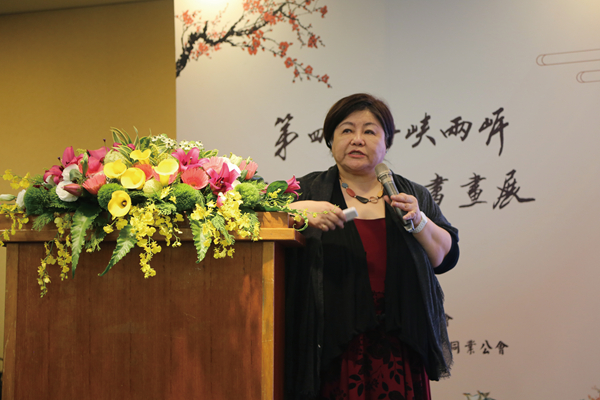
Jiao Xiongping (Professor of Film Department of Taipei National University of the Arts)
The development of Chinese film has experienced several stages in the past 100 years: First, the 1930s was the era of exploration, and Chinese filmmakers sought expression narrative and aesthetics suitable for China. For example, Angels on the Road combines various artistic styles, such as French poetic realism, Russian montage and German expressionism. Second, the 1940s was the time of wars. The escapism of the island and the homeland metaphor of the popular drama coexisted in the images, featuring the representative works such as Spring in a Small Town. Third, the national style was first tested from the 1950s to the 1970s. Mainland films try integrate the poetry and music into images, such as The shop of Lin Familyand February; Hong Kong's film and literature flourished with representative directors as King Hu and Li Hanxiang. Hu's works blended Peking Opera, landscape painting and other traditional Chinese culture, while Li made Chinese folklore, traditional opera and history of the palace story of the Qing Dynasty into films. In addition, Bruce Lee created a kung fu type movie at this period. And Taiwanese films concerning songs and dances, and love, were released from time to time. Fourth, in the 1990s, the crossStraits television circles began to integrate in terms of themes, and performers, and production crews etc., resulting in filming The Condor Heroes and The Legend of the Condor Heroes. Fifth, there were a lot of film and television cooperation in the 21stcentury amongst the mainland, Taiwan, Hong Kong and Macao, such as Crouching Tiger, Hidden Dragon and Hero. Nowadays, the Chinese films have ushered in a century of opportunities and entered a new golden age. At present, the Chinese film industry has become the world's second largest market. Some nontraditional resources, such as real estate, internet and funds are involved in this industry. Future reforms will develop more new types and conduct more international cooperation.
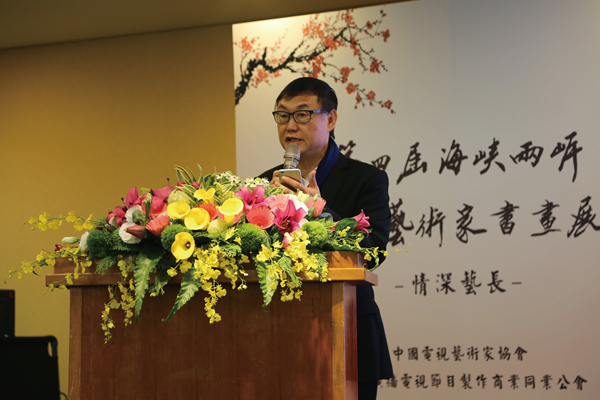
Ho Yim (Director and writer from Hong Kong)
What is culture? Everything that emerged from life is culture. The clothing, food and shelter and transportation of people are all interspersed with the characteristics brought by time and space. This is culture. Means of film and television are the best carrier of cultural heritage. Some disappearing cultures can be reproduced by film and television, which is their advantages. However, the reshaping of traditional culture in film and television works requires deeper exploration. Broadly speaking, taking the essence is reshaping. Film and television is the mass media, most qualified to cause public discussion. In the film and television works, the director objectively presents the survival experience of some people in a certain time and space, reproducing the humanities, lifestyle, joys, angers and sorrows of that era. The audience understand the works subjectively, and the pertinent association is based on the personal life experience, thus achieving the purpose of cultural inheritance. When transplanting a classical work, there is an old saying that may be very inspiring, called "spare no effort in taking advantage of what one puts his hand on." In my opinion, it cannot be considered inheritance of the classical culture via just putting the plot on the screen. If the Three Kingdoms only presents the scenes of wars and slashing, if Water Margin is made into a gangster's revenge, it only focuses on the plot, without taking, the vast society and life in which the characters depend, so that they did not achieve the purpose of inheritance, losing the space for discussion.
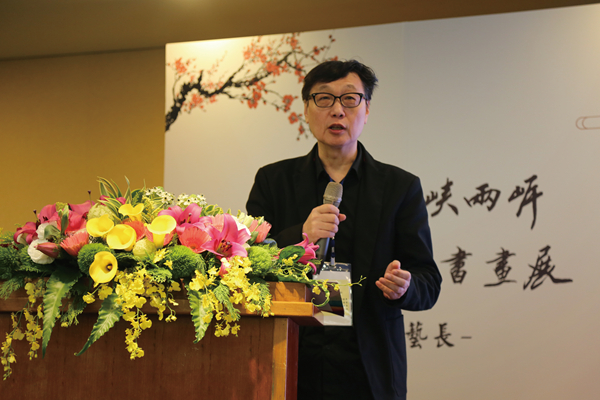
Xu Zidong (Professor, Department of Chinese, Lingnan University, and Vice-President of the Chinese Academy of Literary Theory)
In my spare time, I have participated in TV presentations, live courses, live class, talk shows and audio programs. In all kinds of communication channels, I very much bear a question: Who am I responsible for? I am responsible for the original author of the book, or the current audience? Do I need to consider about my audience feedback? How to listen? How to make more people like it? In the era of Lu Xun, what would happen if there were big data? What if they were affected by feedback from big data audiences that year? Today, there is an "old culture" in new media. The "old culture", such as the chivalrous behavior and the condemnation in the official world may not belong to the negative energy. Mass communication is commercialized inevitably: during the late Qing Dynasty and the Republic of China, an advertisement might be published next to a serious article in the newspaper; there might be a picture of a woman star on the side of a serious article on today's website. Today, if a scholar insists on speaking in the mass media with Lu Xun's style, maybe the young people will ignore you, and even the peers will laugh at you. Even so, as a researcher of Lu Xun, I could not change the original intention of Lu Xun according to big data when I spread him in the mass media, and my original view of him as well. In the future, more and more content will be uploaded to the cloud. When we, the researchers, are the "porters" between the new media and the public, are we the initiators, producers, or controllers?

Wang Yawei (Assistant professor of National Chengchi University)
When I was writing the artist's documentary Yang Yingfeng , I thought about three aspects: First, presentation of an artist in film and television, as a form of dialogue between the East and the West, provides an introspective and forward-looking vision for mankind. Second, the artist is explicit in his works, and his life stories and works have a height that transcends national boundaries, ethnic groups, politics and ideology, regardless of the position of the moment. Third, the artist's documentary film, due to its ability to reproduce the story through video and audio, has to weave different time and space across the age and integrate various transnational materials and comments to propose new discourse.
In the planning of this documentary, the creative team systematically understood the history of civilizations and art in the East and West, visited more than 70 people, hoping to present the relationship between the artist's work and the current environment and the structure of the inner space of the work in the spatial sense of image expression. One of the major difficulties in creation is how to express the artist's thoughts, such as Yang Yingfeng's thinking on the transformation of modern sculptures of Chinese elements, the process of turning from realism to abstraction, and that of transforming from the object of sculpture into the unity of heaven and mankind. The creation of this documentary made me ponder: How does contemporary film and television media reproduce the oriental philosophical and abstract connotations of Chinese artists? How does it transcend the realistic expression of abstraction and philosophy? How to present super time and multi-spaceoriented flow? The biography of film and television artists still has its transcendence and can be avoided from being limited to a local evaluation. In observing the long history of human civilization, the artist is the main part of the big river.

Liu Siming (Vice-president of HTC Virtual Reality Content Center)
VR film and television production is open, which no longer features a flat lens narrative. In the 360-degree panorama, the director's previous central power is weakened, and what kind of narrative is more suitable for VR film and television becomes an important issue. At present, there are no pure VR film and television producers, but they're from various fields, such as film and television, news recording, animation and visual arts. Hence, VR film and television is actually the integration of knowledge, talents and technology. With the rapid development of smart phones, multi-screen audio and video is becoming much more popular, especially the blowout development of the live broadcast market and the arrival of 5G, what kind of "tickets" can be admitted? In the future, all culture, entertainment and e-sports will be existing in a complex manner. Hence, VR is no longer entertainment, but a new business model and a new way of life.
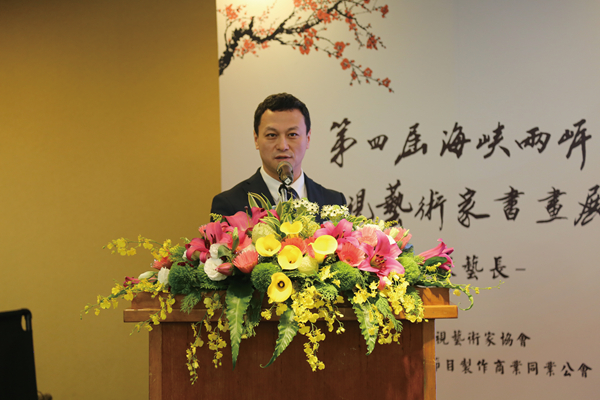
Wen Haojie (Writer, Film and television screen writer)
An era has its own aesthetic need. Creators should pay attention to the cultural and aesthetic needs of time. At present, the aesthetic bias around the world has gone to two extremes: one extreme is represented by Marvel, which is to hold hair to leave the earth; there is also an extreme nostalgia, which is also leaving the real life. However, the middle part - facing the reality, the current political, economic, cultural and real-life literary and artistic works, is relatively lacking. From the classics of TV dramas since the reform and opening up of the mainland, we can find that the aesthetic needs of cultural thoughts in each era have made the works of the times successful. In the past, our aesthetic standards came from literature, and now may come from film and television. In the context of the development of science and technology to promote the advancement of new media and cultural platforms, playwrights should take due responsibility for inheritance and innovation.
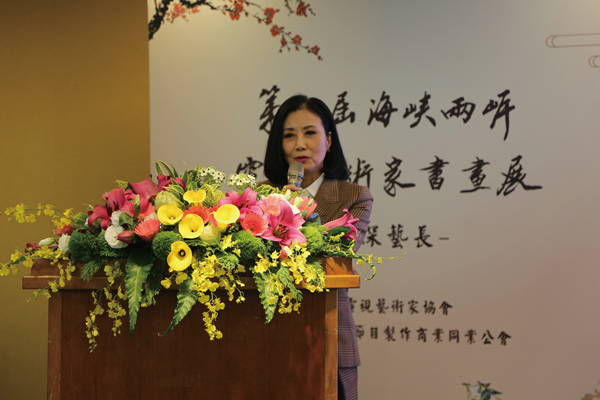
Liza Wang(Chairperson of Chinese Artist Association of Hong Kong, Vicepresident of Association of Hong Kong Performing Circle's Development in Mainland)
Hong Kong's art develops comprehensively, integrating the East and the West. Cantonese opera was included in the UNESCO Intangible Cultural Heritage List in 2009. As a result, the Hong Kong government's resources for Cantonese opera have increased significantly, and the related support from the public has generally enhanced as well. The year of 2018 was the first year of the implementation of the Guangdong-Hong Kong-Macao Greater Bay Area, which holds 70 million Cantonesespeaking residents. In terms of culture, Hong Kong should be more proactive in promoting international cultural exchanges while giving play to its special role in advancing exchanges between the East and the West, mutual understanding of civilizations, and bilateral support among the people. I propose to establish a cultural industrial park in the Bay Area to bring together people with lofty ideals as an incubation base for entrepreneurs in cultural undertakings. This base is targeted to achieve such three purposes as cultural exchange, cultivation and creation. With industrial parks and simplified administrative procedures, touring perform ance projects can be approved at one time. The arts group can have better plans, predict box office returns, attract more investment and increase the number of programs. The Hong Kong SAR Government does not have a dedicated policy bureau responsible for culture and art at present, which may cause resources overlapping or ignorance. It is expected to establish a dedicated department to integrate and implement policies and plans to strengthen the inheritance, education and promotion of traditional culture and art.
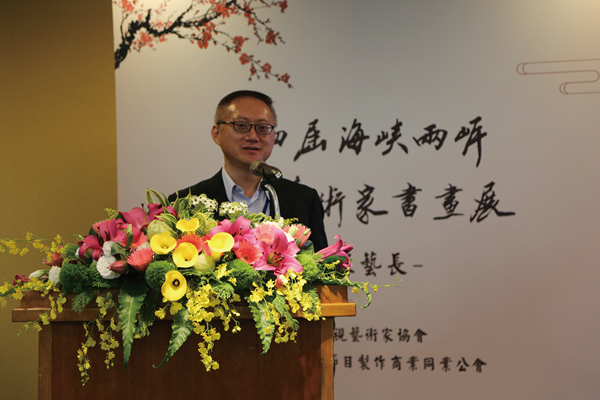
杨宗哲(太极影音科技公司副总经理)
Immersive technology can give people a sense of immersion. With the virtual world created by computer animation, it can lead people to break through time and space and enter an imaginary space. DIGIMAX has cooperated with Taipei Palace Museum for 15 years, witnessing the evolution and various possibilities of new media technology in cultural and artistic performances, and education. From the seven long scrolls of animations of the Old Picture and Animation in the permanent exhibition area of the Taipei Palace Museum, to the VR, such as Autumn Scereny , The Qing court painting etc., DIGIMAX constantly uses new technology to combine in-depth research of historical artifacts to stimulate people's interest in Chinese culture, and spread the culture in an easy and interesting way, and eventually combining culture and public life with related cultural and creative products.
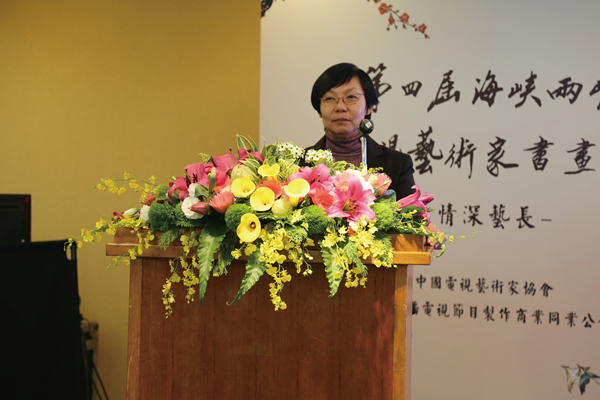
Liao Zixin (Deputy Editor-in-Chief of the Macau Daily, Secretary-general of Macao Literature Circle Association)
Macao literature is both influenced by Western culture and Chinese traditional culture. It con Macao literature has never been interrupted. In the past decade, the Macao Foundation and Macao Writers organized the "Macao Writers' Circle Association" (Pen of Macao) to promote the creation and publication of Macao's novels, and the goal is clear: in response to the Macao government's efforts to develop the film industry so as to accumulate the story of Macao, leading to provide sound foundation of scripts for creation of film and television. As can be found from these works, this generation of Macao authors are more enthusiastic than their predecessors to wander between the Chinese and Western cultures - whether concerning life thinking or life value judgment, there is more concept of inclusiveness; the content of the story and the novel creation techniques are not limited to the traditional, but drawn on many Western modern creative techniques, and more consciously look for story ideas and expand novel's broader world. Meanwhile, since it is very clear that the work has the opportunity to be adapted into a film script, the authors consciously or unconsciously perform visual creation during the process.
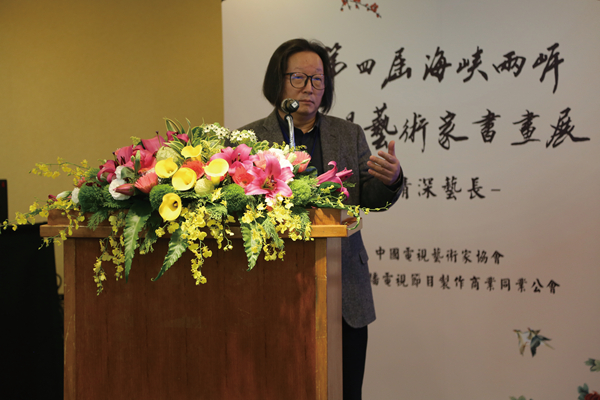
Xia Meng (Top-degree director of CCTV Documentary Channel)
Why is only the Chinese nation maintaining its relatively complete cultural form and has been able to save it to this day? There is a type of geographical determinism, saying that the land on which the Chinese nation depends is rich in deserts in the north, not only vast desert Gobi in the west, but also the tall snow-capped mountains like the Himalayas, Kunlun Mountains and Altai Mountains, the sea in the east and southeast, virgin forest and the high mountains and rivers making our civilization lasting for thousands of years not easily invaded by aliens in a relatively closed environment. However, this is not completely convincing.
I think that the reason for our nation's survival is more because of culture. China: Our Story is a documentary based upon our upcoming collaboration with British and US counterparts. It mainly tells the story of the Chinese nation and reveals the unique DNA and genetic codes hidden in the history of the nation, allowing people to know that the Chinese nation is peace-loving and unwilling to take the extreme. The thought of universal brotherhood in the ancient times is the Community with a Shared Future at present, and the way we connect this world is to realize mutual benefit with the whole world.
Copyright © 2011 CFLAC Corporation, All Rights Reserved



